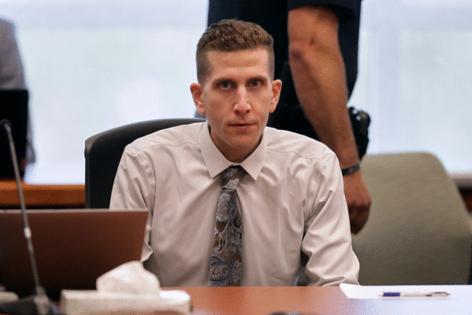Gag order removed in Bryan Kohberger case, allowing Idaho attorneys, police to speak
Published in News & Features
BOISE, Idaho — The presiding judge in Bryan Kohberger’s criminal case has lifted the gag order that prevents investigators, law enforcement and attorneys from speaking publicly about the high-profile homicides of four Idaho students.
“I just don’t think that I can justify the continuation of the non-dissemination order,” 4th Judicial District Judge Steven Hippler ruled at a hearing Thursday that lasted less than 15 minutes. “The rights of the public to information in this case is paramount — given the fact that a plea has been entered in this case.”
Earlier this month, Kohberger, 30, admitted to “willfully, unlawfully, deliberately with premeditation and with malice aforethought” fatally stabbing four University of Idaho students to death: Madison Mogen, Kaylee Goncalves, Xana Kernodle and Ethan Chapin. He broke into their Moscow home in the early hours of Nov. 13, 2022.
Kohberger pleaded guilty to four counts of first-degree murder and a count of felony burglary, bringing some closure to the case that brought national attention to the college town. Kohberger’s all-day sentencing is scheduled for 9 a.m. July 23 at the Ada County Courthouse.
Thursday’s hearing was scheduled after two dozen media outlets and organizations — including the Idaho Statesman — filed a motion asking to rescind the gag order. Other outlets involved in the request included the Moscow-Pullman Daily News and the University of Idaho’s U of I’s student newspaper, the Argonaut, as well as national outlets including The New York Times, CNN and ABC.
During Kohberger’s change-of-plea hearing, Hippler indicated plans to remove the gag order next week after Kohberger’s sentencing. But the news outlets filed a motion shortly after Kohberger’s guilty plea, arguing that the order had been filed to preserve Kohberger’s right to a fair trial.
“There is no possible set of circumstances under which Mr. Kohberger will ever face a jury to determine his guilt or to determine whether the death penalty should be imposed,” the media group wrote. “No trial will occur. Thus, there is no need to preserve Mr. Kohberger’s ‘right to a fair trial’ because he has already admitted guilt.”
Hippler’s decision came on the heels of an objection by the defense to the news organizations’ motion. Anne Taylor, Kohberger’s lead attorney, asked Hippler in a motion to maintain the gag order until after their client’s upcoming sentencing to protect his right to a fair hearing. Taylor also pointed to the “substantial dangers of prejudice” that could affect Kohberger, referring to leaks of confidential information and the “avalanche of publicity.”
Lifting the order now, “this close to the sentencing, would only increase the media frenzy and publicity around the case,” Taylor wrote. “Further release would only serve to gin up the anger and violent rhetoric already at a fever pitch.”
In response, Hippler said the primary purpose of the gag order — to select an impartial jury — was no longer an issue. While the concerns by the defense were “significant,” they don’t outweigh the public’s right to know, Hippler said.
The judge added that he didn’t think lifting the order would “meaningfully impact” the defense’s concerns, since the media will continue to find something to write about in this case.
“Lifting the non-dissemination order does not require counsel or others who were previously bound by it to speak, and the state has indicated they don’t intend to until after the sentencing,” Hippler said. “And certainly, I would hope that the media interests would respect those positions and give people the space that they need and request.”
The court intends to have “appropriate security measures” in place to ensure the families of the victims and Kohberger can get in and out of the court without speaking to the media if that’s what they’d like to do next week, he added.
Prosecutors in the case and some law enforcement still have declined to speak until after sentencing.
Taylor and the defense team declined to comment in a letter to the Statesman, and said they won’t make any statements before or after the sentencing.
“We will continue to keep our focus on Mr. Kohberger and comply with our ethical obligations under Rule 1.6 of Idaho’s Attorney Professional Conduct,” they wrote in the letter, referring to a rule that prohibits attorneys from commenting on their client’s case without “informed consent” from the defendant.
Attorneys representing the news outlets also filed a motion asking Hippler to unseal all of the records in Kohberger’s criminal case, which Hippler declined to do. He said he likely wouldn’t begin unsealing records until after Kohberger is sentenced, and plans to issue an order outlining the process for reviewing those records.
Other public records in the case, like body-camera footage or police reports, won’t be released until after the sentencing is complete, the city of Moscow announced in a news release. Because of the “significant public and media interest” in Kohberger’s case, the city plans to make some of the investigative reports available to the public and media at no cost to enhance access to public information and reduce the burden on city staff, the city said.
_____
©2025 Idaho Statesman. Visit at idahostatesman.com. Distributed by Tribune Content Agency, LLC.







Comments